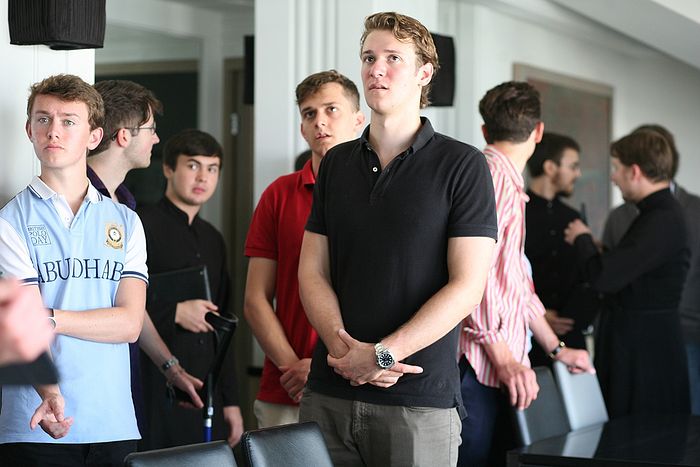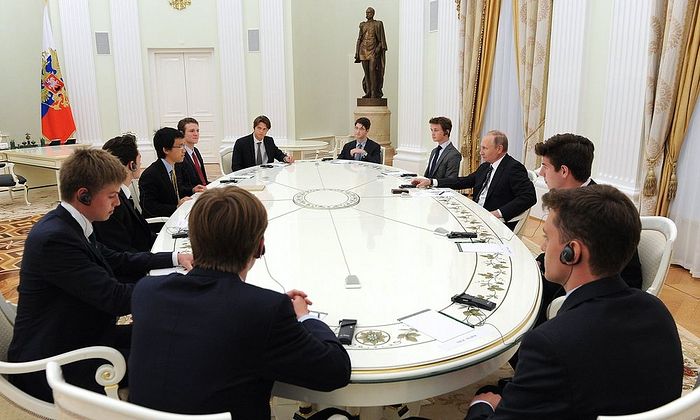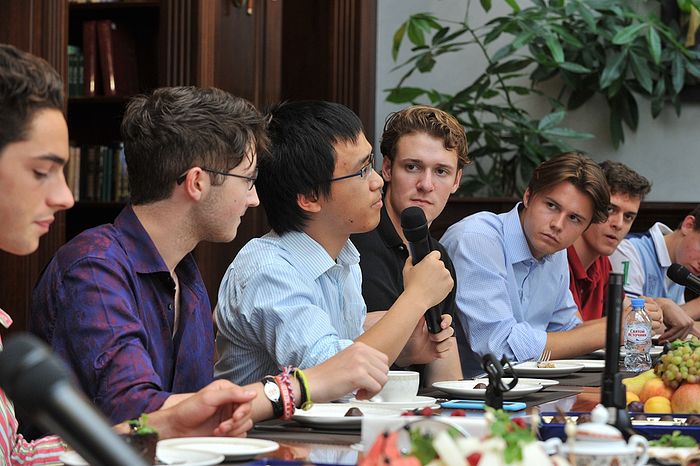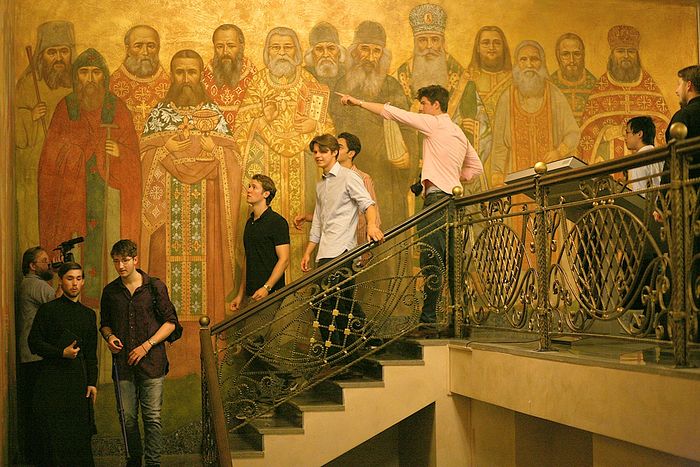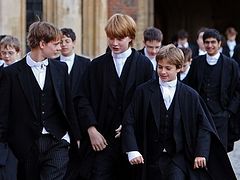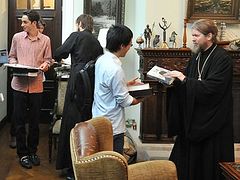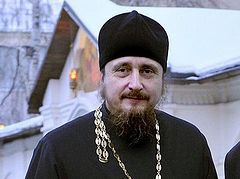At the end of August, ten students of Eton made a private, unofficial visit to Russia, during which they spent time in Moscow and St. Petersburg, became acquainted with their Russian counterparts, and met with the President of Russia Vladimir Putin. We asked the boys to share their impressions.
—What made you decide to visit Russia? How did you get to meet with Vladimir Putin? Did you write to him individually, or collectively?
Trenton Bricken:
—Collectively. The initiative was led by David, who’s been the real mastermind and motivator behind all of this, and I don’t think any of it would have been possible without him. David invited me because he noticed at our meeting with Bishop Tikhon back at Eton that I had prepared several questions, and that I’m generally interested in politics, economics, and so on, and he thought that I would benefit a lot by it—and I certainly have. Personally, I really wanted to learn more about Russia and I’ve always wanted to travel here. Had I come by myself or with my family we never would have experienced all the things we have or received the same hospitality.
It’s hard for Westerners to travel to Russia. I remember checking my bags in Raleigh, North Carolina, which is quite a Republican state. The guy checking my bags had a look of shock and horror when I told him I was traveling to Moscow. It’s an unhealthy attitude. And to receive a visa I had to fill out every place I’ve been to in the past ten years with the day, month and year. I can’t remember where I went when I was eight years old; so it is very difficult to travel here.
It’s been surreal having this opportunity and seeing the Russian story and the Russian perspective, which you have to understand if you ever want to create a compromise or bridge the differences between Russia and the West.
David Wei:
—In terms of why I wanted to write a letter to President Putin: I didn’t really think it was going to happen, that it was too good to be true, but I figured it was worth a try. I didn’t shower him with praise as perhaps others might do—I figured he wouldn’t care about that. I simply said we are students from Eton and we would like to meet him, to hear the Russian side of the story on various things, because we realize our Western media is biased.
—What are your brightest impressions of Russia?
Joss Tricks:
—I’ve been struck by how connected the Russian people are. They have a very strong sense of national identity, and I’d say that this is expressed not only in the long history and traditions of Russia but also in the sort of support for President Putin—which in our experience here has been unanimous.
Also, it seems to me that Russians are not so different from the British or Americans or the French, and everyone has been so kind and accommodating, which has been really amazing. Russians themselves have been very keen to learn about us and also very keen to tell us about Russia, for which I am very grateful.
Hugo Engel:
—I feel that as a people they are very united. I think they have a very strong sense of a shared tradition and shared culture, which really binds them together, and I can see how this is essential for a country which encompasses nine different time zones and needs to foster a sense of nationhood and pride in the country’s history. But I think the flipside of that, and what makes it very different from Britain and European countries I’ve visited in the past, is that some political views seem very different from what I’ve been exposed to in the past. I’ve really enjoyed speaking to people that have completely different views, and I love having lively debates. I’ve been surprised at how open all the students are to having these kinds of discussions. I come from a more Western liberal standpoint, and I haven’t had much experience with Russian nationalism, but it’s been really interesting to hear about it.
—What particular characteristics do you think the Russian mentality has?
Marc Woernle:
—In general non-Russians tend to think that Russians are cold and distant, but from meeting the president and many other people, we’ve seen that people have a really great sense of humor, although sometimes you can’t tell if they’re joking or not; but I think that’s a strength of a great tradition and history and culture, all mixed into one.
Trenton Bricken:
—I need to reflect more, especially when I return back to the West, but the first thing that struck me when we did our subway tour on our first evening and throughout the trip is the number of Soviet artifacts, such as the red stars or the sickle and hammer, which are everywhere. It reflects Russian tradition, Russian pride in history and the different perceptions that Russians have, which led me to think a lot about nationalism, patriotism, and national identity; and also about how I previously hadn’t really noticed, but there are many such artifacts in the West, particularly in America with flags being flown on every backyard porch and pictures of the eagle, and so on. You become so used to seeing them that you don’t really acknowledge them.
I think Russian people are very nice and respectful, and if anything, a bit reserved. When we did our subway tour we were wearing these funny earphones and receivers to pick up the guide’s voice and no one at the subway really stared at us at all. They just continued on like it was none of their business. But I think if I were in America or the UK, people would be staring at us quite a bit.
I’ve also been very impressed by—and this again links back to Russian history and pride—the sheer number of historical buildings and their grandeur—how beautiful they are and how well they’re preserved. It was interesting to hear about how during the Soviet times many of the churches were destroyed, which is such a shame; but yet they’ve all been rebuilt and are now probably more beautiful than before.
—Not many people from the West have had the opportunity to meet with the President of Russia personally. Did your acquaintance with him meet your expectations?
Marc Woernle:
—We were all very impressed by him, and not only his presence, but particularly that he was able to remember everything about anything: states, statistics, what someone said to him fifteen years ago and things like that. His memory was really impressive.
We were also impressed simply by the fact that he was willing to talk to us mere students and explain all his policies in the Middle East, and to speak about the past and the future. His insights were very interesting and we all came out of the meeting quite impressed.
Hugo Engel:
—In the West he’s made out to be a boogeyman—I don’t know how that would translate into Russian. It’s a word which expresses more of an idea than a person, and that’s the view of Russian nationalism (supposedly separated from the rest of the world), coupled with Russian aggression. The idea becomes so detached from the idea of there being a person that meeting the man himself was surreal. What we learned is that he is a human, he’s personable, he’s warm, and he’s intelligent. I’ve had so many messages from friends asking me, “What was it like to meet Putin?” There’s been so much interest about it and they’ve all been so surprised at how I’ve reported it because my impression was so different from how he’s portrayed in the West.
Joss Tricks:
—During our two-hour meeting I was struck by his profoundness, his humor, and his willingness to listen to us. We asked him for life advice needed for becoming leaders. His deeper message was to always consider your actions and their influence on other people, but once you’ve made a decision as a leader you should follow it through with conviction.
His willingness to listen to us and our views was also lovely to see. We asked if the president had any questions for us, and he displayed a keen interest in learning about who we are, what our school is, how we’ve done at Eton, and so on. And even after he announced that he had to go do some work he took two more questions and gave thoughtful, thorough answers.
David Wei:
—I think it’s very common to try to devalue politicians because of a distrust that everything they say is for political gain and to follow the party line, rather than to serve the public interest. As human beings we need to trust each other. But nowadays, I think that one of the reasons why turnout in elections is so low—in the UK it can be just 66%—is because people don’t trust politicians. In the West they tend to portray Russia as a tyrant with a tyrannical leader.
I must confess that just before the meeting, and for three or four months, I’d been wondering why he would even meet with us and I was assuming it was somehow for political gain, with lots of press to be present and everything. I even prepared a press statement to read in case people were there waiting for us when we left the Kremlin. But I was pleasantly surprised to see that there was no press. There were only photographs for our sake and for the president’s personal sake.
I must admit that I have been skeptical of Russia due to my Western upbringing, but part of why I’m on this trip is to hear the other side and possibly even convince myself of another conclusion. I’ve been struck by the fact that even the most powerful man in the world, who has caused such strong opinions in the West, has a human side to him. We were told that the reason our meeting was not publicized is because Putin does not see it as a political event, but as a personal event for his sake. It’s very striking to be able to relate to him on a personal level and not just on a political level. Political relationships such as those between Putin and Theresa May, and Putin and Francois Holland are not necessarily personal. However, I think personal relationships are the deepest and most profound form of relationships and I think they are the ones God calls us to make.
Nick Maier:
—I try to avoid building up prejudices or false expectations based on the media because I know that things are often distorted. I try to have no preconceptions, so it’s quite difficult to say how my expectations matched up if I didn’t have any.
—What are your impressions of Moscow State University, of Sretensky seminary?
Joss Tricks:
—Visiting both institutions provided fascinating insights into the differing approaches to education that continue to seemingly work well and co-exist within Russia’s education system. From science, geology and mathematics to theology and Latin, it was apparent that both sets of students displayed a keen pride for their alma mater and fellow classmates. Their proficiency in English was also very inspiring!
—Have you heard anything about Orthodoxy before?
Trenton Bricken:
I’ve heard about Orthodoxy before but my first experience with it was through meeting Bishop Tikhon at Eton. I then learned more about it by traveling to Mt. Athos where there are a lot of Greek Orthodox churches, but I understand that they’re very similar to Russian churches. I think the biggest difference between Orthodoxy and Catholicism (I was raised and confirmed Catholic although I’m not a serious practitioner), or at least the visible one, is the use of icons and how elaborate and beautiful the Orthodox churches are.
As for Bishop Tikhon, I’ve been incredibly impressed with him, if not slightly intimidated by him from the very beginning. I think that he has a great presence and an aura around him and I think he could certainly be seen as spiritual. He has many interesting insights, observations, and explanations, which he has shared throughout the trip. I think that he’s also a leader; he’s achieved an incredible amount in a very small amount of time. Someone said that if he does a project he likes to complete it to the fullest—and I think that’s fantastic. The church that’s being built looks like it will be absolutely incredible. I wish we were coming four months later so we could see it in all its glory.
Hugo Engel:
—Also, I would really, really love to thank Bishop Tikhon for being hospitable throughout the whole trip and giving us an experience that I’ll never forget. This visit to Russia is something I could never have achieved as a tourist and meeting with Putin is something that I don’t think I’ll ever top in my life. So we have such a great debt of gratitude for putting this all on for us, and we hope that he can visit England and Eton again very soon.
—Do you believe that the relationship between Great Britain and Russia, as it is now, is in a bad state? Do you think that someday there could be an improvement in relations between the peoples and governments?
Joss Tricks:
—I would always hope so. I think we’re increasingly seeing terrorism and xenophobia sweep across the globe and it’s easy to get caught up in that and start fearing the other. I think there should be and I hope there is always room for improvement between Britain and Russia. I think that as everything gets increasingly panicky in the world it’s important for leading nations like Russia and Great Britain to work together and not against one another. As the president himself said, cooperation, understanding, and mutual respect is how a lot of these issues will be figured out.


